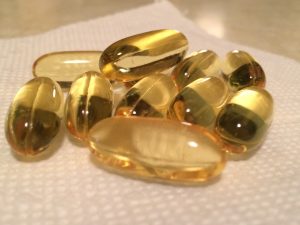 Fish Oil supplements are one of the main supplements you will find on the market today. Many people take them simply because “I know it is good for me”, but do not fully understand the benefits to their health. This article is meant to bring to light some of the research on the supplement, and some ins and outs that are important to know for choosing the right supplement. Of course, when in doubt, please consult a naturopathic doctor to determine what supplement would best help you with your specific health needs.
Fish Oil supplements are one of the main supplements you will find on the market today. Many people take them simply because “I know it is good for me”, but do not fully understand the benefits to their health. This article is meant to bring to light some of the research on the supplement, and some ins and outs that are important to know for choosing the right supplement. Of course, when in doubt, please consult a naturopathic doctor to determine what supplement would best help you with your specific health needs.
Ratios
If you are a patient of mine, you already know that I think ratios are important when it comes to fish oil. In short, children need more DHA as their brains are developing, and adults need more EPA to sustain it. As a result, the ratio of EPA to DHA needs to be 2:1 or higher depending on your particular health concerns. For example, if EPA is 200mg is a capsule, I would like to see DHA at 100mg or less. Some individuals may want to try to obtain omega 3s through vegan sources such as flax and hemp, but these sources tend to not be able to obtain the same ratio of EPA:DHA that fish oil can.
Sourcing
Ideally smaller fish sources, such as sardines, act as a better source for omega 3’s due to the lower mercury content in these fish. However, all supplements have to meet a standard in regards to mercury content, and so, if you are purchasing a high quality fish oil supplement made in Canada, they need to comply with this standard.
6 Health Benefits
- Joint Health
One of the main uses of fish oil is for pain. Specifically, it can be beneficial for osteoarthritis, rheumatoid arthritis, gout, etc. Fish oil helps to lubricate your joints and decrease inflammation, both leading to decreased pain.
- Heart Health
Fish oil can be quite beneficial for overall heart health by firstly improving the function of the heart muscle itself. In addition, fish oil may help to increase HDL (good) cholesterol, decrease triglycerides, decrease blood pressure, decrease atherosclerosis (i.e. plaque build-up), and prevent stroke.
- Weight Management
Fish oil may help to improve weight by decreasing central adiposity when taking with exercise. It has also been shown to aid with conversion of muscle to lean muscle mass.
- Mental Health
As mentioned above, EPA and DHA both have a role to play in brain development and health. In short, fish oil may be beneficial for the following conditions: depression, anxiety, schizophrenia, bipolar disorder, and dementia.
- Skin Health
Fish oil can be beneficial for various skin conditions through its beneficial properties in addressing inflammation. That being said it may provide some relief to those suffering from acne, psoriasis, SLE, and eczema.
- Reproductive Health
In general, fish oil can help women who are trying to conceive, have conceived, and women who are not conceiving. In regards to pregnancy, fish oil may help increase chances of conception. Fish oil can also help to decrease inflammation overall which may contribute to premenstrual tension issues such as cramping. In addition, fish oil may prove to be beneficial for men experiencing erectile dysfunction due to is beneficial properties in heart health – specifically related to blood pressure, cholesterol, and atherosclerosis.
Have you benefited from reading this blog? Know someone that would benefit as well? Share, Like, Comment, or Tweet this article, and let me know what you think.
Some of the information provided above may not be appropriate for everyone, please consult with your doctor before trying any of the above. If you are interested in Naturopathic Medicine and wanting a different approach to your health care needs, contact Dr. Elisha Cook ND by calling 519-537-7058 and book your appointment today!

